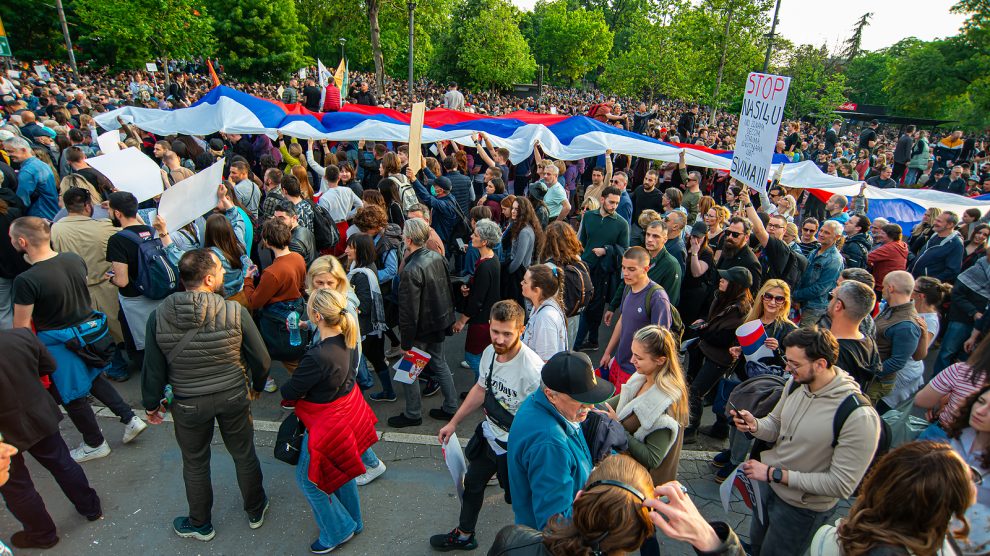Tens of thousands of Serbians continue to join Serbia Against Violence protests weeks after two tragic mass shootings stunned the nation.
On May 3, a 13-year-old boy killed nine children and one security guard at a Belgrade elementary school in Serbia’s first school shooting and injured six other children and a teacher. The next day, a 21-year-old man armed with an automatic assault rifle opened fire from a car and went on a shooting spree that killed eight and injured 14.
Serbia declared a three-day state of mourning. The country’s union of educators announced a strike and called for the installation of metal detectors at school entrances and the hiring of professional security.
- The US and EU need a new roadmap to solve the Serbia-Kosovo conflict
- Economy in Focus: Serbia
- For the Western Balkans, the EU’s mixed messaging continues
“We live in a society where aggression and violence are ubiquitous: verbal, media, physical,” said the union in a statement “It has reached its peak not only in schools, but in the entire society. As a society and as a country, we failed. Serbia needs to stop and ask itself how far it has come and where and how it should go after this.”
The Serbian Education Workers’ Union has been concerned about increasing violence in schools for years and previously held protests to raise awareness about the issue in January 2022.
Since the shootings, tens of thousands of protesters have gathered each weekend in Serbia’s largest cities to call for an end to violence and the resignation of the politicians they blame for the unacceptable status quo and for failing to bring criminal groups to justice—namely Serbian President Aleksandar Vučić, Interior Minister Bratislav Gašić, and secret service chief Aleksandar Vulin.
Serbia’s Education Minister Branko Ružić resigned on May 7.
The organisation Serbia Against Violence held a seventh round of protests in Belgrade, Novi Sad, and Nis on June 17.
Guns and society
Since the wars of the 1990s, the Western Balkans has been awash with hundreds of thousands of illegal firearms.
Around six per cent of Serbians—400,000 people—legally own guns, excluding the licensed hunting weapons held by another 78,000 people. Many more have illegal arms. With an estimated 39 firearms per 100 people, Serbia ranks third in the world in gun ownership rates, behind only the United States and Yemen.
Serbia has a strong gun culture, especially in rural areas where guns often feature in wedding and birthday festivities. Guns are passed down from grandfathers to fathers to sons.
Many in the anti-violence movement have linked gun violence to the prominent public roles afforded to Serbs convicted of war crimes in the 1990s. Former Serb general Ratko Mladić has called into national television from prison in The Hague, and another convicted war criminal, Vojislav Šešelj, appeared on Serbian television to offer his thoughts on the shootings.
“We demand for a ban on the promotion and public appearance of all convicted criminals, as well as all reality shows in which the participants behave violently,” said the educators’ union.

The political response
Despite the prevalence of firearms in Serbia, the gun laws in place are already reasonably strict. To legally purchase a gun, Serbians over the age of 18 must go through a background check process to get a permit. Medical exams every five years are also mandatory to ensure there is no history of mental health issues or substance abuse.
The 13-year-old school shooter used two of his father’s legally-owned guns, which the shooter took from a safe at home.
After the second mass shooting, Vučić called for “almost complete disarmament” and set a 90 per cent decrease in the number of legal gun owners as a target. The government declared a one-month amnesty period for citizens to turn unregistered guns into the state, and Serbians voluntarily surrendered 13,500 items including guns, hand grenades, and anti-tank rocket launchers in the first week.
This is surely welcome progress, but there is still a long way to go to reducing 400,000 legal gun owners to 40,000.
Opposition parties have participated in the protests against the government, and the prime minister, Ana Brnabić, offered to resign to test the popularity of the ruling coalition.
“When the society is in a crisis, talks are the only way … and they do not want to talk. I am ready and you may count on my resignation,” said Brnabić.
Opposition leaders have said they will not meet with the government until the interior minister and secret service chief resign.
Unlike many news and information platforms, Emerging Europe is free to read, and always will be. There is no paywall here. We are independent, not affiliated with nor representing any political party or business organisation. We want the very best for emerging Europe, nothing more, nothing less. Your support will help us continue to spread the word about this amazing region.
You can contribute here. Thank you.







Add Comment